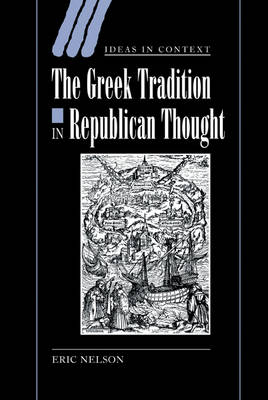
The Greek Tradition in Republican Thought
Seiten
2004
Cambridge University Press (Verlag)
978-0-521-83545-9 (ISBN)
Cambridge University Press (Verlag)
978-0-521-83545-9 (ISBN)
The Greek Tradition in Republican Thought traces the influence of ancient Greek sources on the development of republican theory in Europe and America. It offers a substantial revision of standard narratives of the trajectory of republican political theory from the ancient to the modern world.
The Greek Tradition in Republic Thought completely rewrites the standard history of republican political theory. It excavates an identifiably Greek strain of republican thought which attaches little importance to freedom as non-dependence and sees no intrinsic value in political participation. This tradition's central preoccupations are not honour and glory, but happiness (eudaimonia) and justice - defined, in Plato's terms, as the rule of the best men. This set of commitments yields as startling readiness to advocate the corrective redistribution of wealth, and even the outright abolition of private property. The Greek tradition was revived in England during the early sixteenth century and was broadly influential throughout the seventeenth and eighteenth centuries. Its exponents included Sir Thomas More, James Harrington, Montesquieu and Thomas Jefferson, and it contributed significantly to the ideological underpinnings of the American Founding as well as the English Civil Wars.
The Greek Tradition in Republic Thought completely rewrites the standard history of republican political theory. It excavates an identifiably Greek strain of republican thought which attaches little importance to freedom as non-dependence and sees no intrinsic value in political participation. This tradition's central preoccupations are not honour and glory, but happiness (eudaimonia) and justice - defined, in Plato's terms, as the rule of the best men. This set of commitments yields as startling readiness to advocate the corrective redistribution of wealth, and even the outright abolition of private property. The Greek tradition was revived in England during the early sixteenth century and was broadly influential throughout the seventeenth and eighteenth centuries. Its exponents included Sir Thomas More, James Harrington, Montesquieu and Thomas Jefferson, and it contributed significantly to the ideological underpinnings of the American Founding as well as the English Civil Wars.
Eric Nelson has been a Research Fellow of Trinity College, Cambridge and is currently a Junior Fellow in the Society of Fellows, Harvard University. This is his first book.
Acknowledgements; Note on conventions; Introduction; 1. Greek nonsense in More's Utopia; 2. The Roman agrarian laws and Machiavelli's modi privati; 3. James Harrington and the 'balance of justice'; 4. 'Prolem cum matre creatam': the background to Montesquieu; 5. Montesquieu's Greek republics; 6. The Greek tradition and the American Founding; Coda: Tocqueville and the Greeks; Bibliography; Index.
| Erscheint lt. Verlag | 19.2.2004 |
|---|---|
| Reihe/Serie | Ideas in Context |
| Verlagsort | Cambridge |
| Sprache | englisch |
| Maße | 160 x 235 mm |
| Gewicht | 650 g |
| Themenwelt | Geschichte ► Allgemeine Geschichte ► Vor- und Frühgeschichte |
| Geisteswissenschaften ► Geschichte ► Regional- / Ländergeschichte | |
| Geisteswissenschaften ► Philosophie ► Philosophie des Mittelalters | |
| Sozialwissenschaften ► Politik / Verwaltung ► Politische Theorie | |
| ISBN-10 | 0-521-83545-3 / 0521835453 |
| ISBN-13 | 978-0-521-83545-9 / 9780521835459 |
| Zustand | Neuware |
| Haben Sie eine Frage zum Produkt? |
Mehr entdecken
aus dem Bereich
aus dem Bereich
auf den Spuren der frühen Zivilisationen
Buch | Hardcover (2023)
C.H.Beck (Verlag)
CHF 27,95
Konzepte – Methoden – Theorien
Buch | Softcover (2024)
UTB (Verlag)
CHF 55,85
Was Pompeji über uns erzählt
Buch | Hardcover (2023)
Propyläen (Verlag)
CHF 44,75


